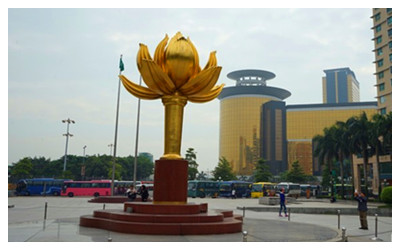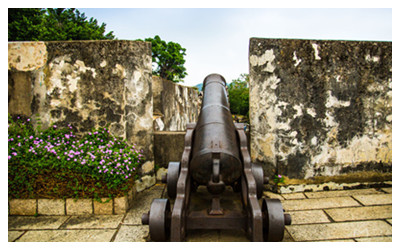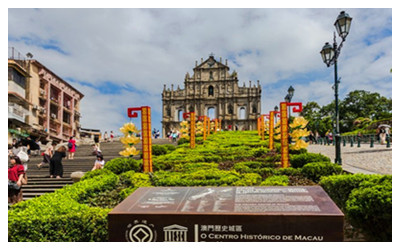Skype: neodalle-travel
Tel: +86 135 7447 2266
E-mail: sales@visitaroundchina.com

 The name of Macau is derived from the word Magao (A-Ma Temple), which was the shrine dedicated to Mazu, a sacred sea goddess respected by the local people. It was said that in the middle of the 16th century when the Portuguese first set foot there, one of the officers asked a fisherman the name of the land. The man misunderstanding the officer's meaning, answered 'Magao' - the name of A-Ma Temple in front them. The word became the Portuguese name for the land for nearly 400 years as the Portuguese ruled here prior to its official return to the People's Republic of China on December 20, 1999.
The name of Macau is derived from the word Magao (A-Ma Temple), which was the shrine dedicated to Mazu, a sacred sea goddess respected by the local people. It was said that in the middle of the 16th century when the Portuguese first set foot there, one of the officers asked a fisherman the name of the land. The man misunderstanding the officer's meaning, answered 'Magao' - the name of A-Ma Temple in front them. The word became the Portuguese name for the land for nearly 400 years as the Portuguese ruled here prior to its official return to the People's Republic of China on December 20, 1999.
1. The recorded history of Macau can be dated back to Neolithic. About 5000 years ago, Chinese mainland ancestors have already set their footprints in this area. The relics they left, like potteries, jades and stone objects are similar with the ones discovered in present Zhuhai area, which indicated that, they belong to the same cultural system. It is believed that, fishermen from Fujian and farmers from Guangdong were the first known settlers in Macau.
2. Macau still be a remote place to mainland people that time, it just become a temporary boarding place. It welcomed its first group of guests till the 12th century. Because of the decade of South Song Dynasty, Hundreds of thousands of the troops turned to Macau and settled down there. Gradually, Macau developed to a fisher town.
 3. In 1557, the Portuguese reached Macau and settled, they obtained privileges and made Macau their concession. The first Portuguese ship anchored in the Pearl River estuary in 1513, and further Portuguese visits followed regularly. Trade with China commenced in 1553. Four years later Portuguese paying tribute to China settled in Macau, which became the official and principal entrepôt for all international trade with China and Japan and an intermediary port for ships traveling from Lisbon to Nagasaki (at the time, Japan’s only outport for trade). China, nonetheless, still refused to recognize Portuguese sovereignty over the territory. The first governor was appointed in the 17th century, but the Portuguese remained largely under the control of the Chinese. Missionaries carried over on Portuguese ships transformed Macau into an East Asian centre of Christianity. Even though China’s trade with the outside world was gradually centralized in Guangzhou (Canton) toward the end of the 18th century, merchants were allowed into Guangzhou only during the trading season—from November to May—and the international merchant community established itself at Macau. By the mid-19th century the British colony of Hong Kong had surpassed Macau in trade, and within a few years the merchants had largely deserted the Portuguese possession, which never again was a major entrepôt. In 1887, corrupted Qing Dynasty signed the unequal treaty and let Macau become one of the colonies of Portugal till 1999.
3. In 1557, the Portuguese reached Macau and settled, they obtained privileges and made Macau their concession. The first Portuguese ship anchored in the Pearl River estuary in 1513, and further Portuguese visits followed regularly. Trade with China commenced in 1553. Four years later Portuguese paying tribute to China settled in Macau, which became the official and principal entrepôt for all international trade with China and Japan and an intermediary port for ships traveling from Lisbon to Nagasaki (at the time, Japan’s only outport for trade). China, nonetheless, still refused to recognize Portuguese sovereignty over the territory. The first governor was appointed in the 17th century, but the Portuguese remained largely under the control of the Chinese. Missionaries carried over on Portuguese ships transformed Macau into an East Asian centre of Christianity. Even though China’s trade with the outside world was gradually centralized in Guangzhou (Canton) toward the end of the 18th century, merchants were allowed into Guangzhou only during the trading season—from November to May—and the international merchant community established itself at Macau. By the mid-19th century the British colony of Hong Kong had surpassed Macau in trade, and within a few years the merchants had largely deserted the Portuguese possession, which never again was a major entrepôt. In 1887, corrupted Qing Dynasty signed the unequal treaty and let Macau become one of the colonies of Portugal till 1999.
 4. In the 1930s and ’40s Macau, declared a neutral territory during the Sino-Japanese War and World War II, became a refuge for both Chinese and Europeans. The Chinese population in the territory continued to grow when the communist government assumed power in China in 1949. In 1951 Portugal officially made Macau an overseas province. Following a military coup in Portugal in 1974, the government allotted more administrative autonomy and economic independence to the territory. The constitution promulgated in 1976 established the Legislative Assembly, which was dominated by the minority Portuguese. Until diplomatic relations were solidified between Portugal and the communist government in China in 1979, discussions on transferring Macau to Chinese control were fruitless.
4. In the 1930s and ’40s Macau, declared a neutral territory during the Sino-Japanese War and World War II, became a refuge for both Chinese and Europeans. The Chinese population in the territory continued to grow when the communist government assumed power in China in 1949. In 1951 Portugal officially made Macau an overseas province. Following a military coup in Portugal in 1974, the government allotted more administrative autonomy and economic independence to the territory. The constitution promulgated in 1976 established the Legislative Assembly, which was dominated by the minority Portuguese. Until diplomatic relations were solidified between Portugal and the communist government in China in 1979, discussions on transferring Macau to Chinese control were fruitless.
5. In March 1984 the Portuguese governor dissolved the assembly in response to opposition within the government to extend the right to vote to the Chinese majority. A few months later new elections, which included Chinese suffrage, finally brought a significant number of Chinese deputies into the government. In April 1987 Portugal and China reached an agreement to return Macau to Chinese rule in 1999, using the Hong Kong Joint Declaration between Britain and China as a model. They agreed to provisions under the Basic Law that would ensure the autonomy of Macau for 50 years after the start of Chinese rule. These included Macau’s right to elect local leaders, the right of its residents to travel freely, and the right to maintain its way of life, both economically and socially. Defense and foreign policy matters were to be administered by China, and those living in Macau without Portuguese passports would become Chinese citizens. Elections continued to turn out record numbers of voters and a Chinese majority legislature. On December 20, 1999, Macau became a special administrative region under Chinese sovereignty, as Hong Kong had in 1997.
6. The period since reunification has been peaceful and marked by increasing prosperity. Much of the region’s economic growth has come from the tremendous expansion in gambling and gaming since 2000, which transformed Macau into one of the world’s largest gambling centres (in terms of revenue). Tourism also has risen sharply from levels in the 1990s. Major infrastructure projects have included continued land reclamation throughout the region and a third bridge (opened 2005) between Macau Peninsula and Taipa Island. The political situation has been stable, with orderly legislative elections. Ho Hau Wah (Edmund Ho) was named Macau’s first chief executive at reunification in 1999; he was reelected to a second term in 2004. In 2009 Chui Sai On was elected president, succeeding Hau. By the mid-2010s his administration was facing a sharp decline in gaming revenues.
 Ask Questions ?
Ask Questions ?